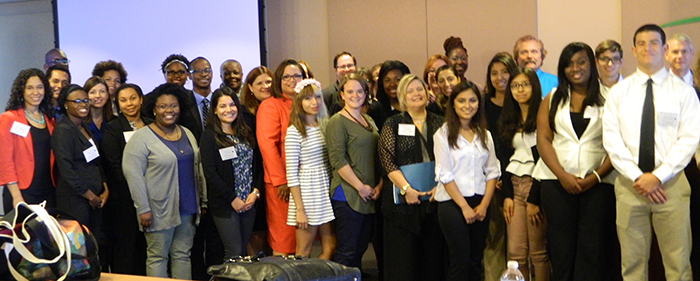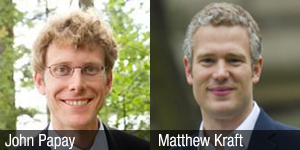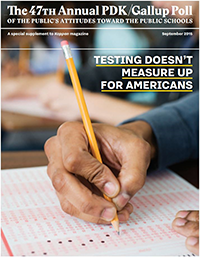27 Oct2015
By Guneev Sharma and Kristin McCabe
A new study out of the National Center for Education Statistics (NCES) helps debunk the oft-repeated assumption that half of new teachers leave the profession in the first 5 years. Overall, some 77% of participants in the Beginning Teacher Longitudinal Study continued teaching for 5 straight years, and the rate was even higher (80%) for those who had a mentor or participated in an induction program—just two of the many influences on teachers’ career paths studied for the report.
Career Paths of Beginning Public School Teachers first scrutinizes both broad and detailed career paths of 155,600 teachers who began their classroom career in the 2007-08 academic year. Then it looks at a subset of 1,440 teachers’ characteristics in their first and in their final year of teaching, covering personal demographics, student and school factors, and professional preparation and in-school supports.
13 Oct2015
By Amanda Lester and Omar Davis

Participants in the inaugural Project LEAD Summit of the Associated Colleges of Illinois
On September 25, AACTE staff had the privilege of taking part in the inaugural Project LEAD (Leaders in Education Advocating for Diversity) Summit in Chicago, Illinois. The summit was a daylong conference conducted by the Associated Colleges of Illinois Center for Success in High-Need Schools to engage teacher candidates and faculty in interactive discussions focused on increasing diversity in the teacher workforce.
29 Sep2015
By Zachary VanHouten
In an apparent attempt to expand its reach beyond that provided by the partnership with U.S. News & World Report, the National Council on Teacher Quality (NCTQ) today unveiled a new interactive web site aimed at helping prospective teachers select a preparation program based on the ratings developed in NCTQ’s Teacher Prep Review.
The new web site, Path to Teach, translates the standards used in NCTQ’s Review into an at-a-glance scorecard for programs throughout the country.
25 Sep2015
By Kristin McCabe
Teacher educators and teacher candidates have new resources in two high-level summaries of the research on learning. By distilling and organizing the existing research on cognitive science and educational psychology, the reports offer teacher candidates concise summaries of high-impact practices grounded in scientific evidence and professional consensus around PK-12 learning. Teacher preparation programs might find them valuable as resources to tie together learning science concepts that are integrated across multiple courses.
18 Sep2015
By Sharon Robinson
Sometimes the story is as good as the headlines, and sometimes it’s even better. The New York Times op-ed “Teachers Aren’t Dumb” (Sept. 8) by Psychologist Daniel T. Willingham is a case in point. As Willingham notes, contrary to popular belief, new teachers are solid academic performers. And as his article asserts, they can benefit from the research on effective teaching that is being conducted in the schools of education that prepare them. Willingham also points out—with rhetorical hyberbole—that not all preparation programs are using the latest research. While program quality varies, the excellent preparation provided by the universities whose researchers he cites illustrates that teacher education has strong exemplars. Unfortunately, Willingham does not acknowledge the widespread change within the education preparation community.
The direction of today’s preparation programs is truly good news. Willingham accurately identifies two guiding principles for improving teacher preparation and program accountability: evaluate programs based on graduates’ performance on a rigorous, credible culminating assessment, and base that assessment (and programs’ content) on evidence of what works best for student learning.
15 Sep2015
By Guneev Sharma

Research out of Brown University (RI) shows that teachers improve tremendously in their first year of teaching and continue to do so during their career. Researchers John Papay and Matthew Kraft discussed this work in a free AACTE webinar last month, “Toward a Broader Conceptualization of Teacher Quality: How Schools Influence Teacher Effectiveness,” which was recorded and is now available in AACTE’s Resource Library.
Papay, assistant professor of education and economics, and Kraft, assistant professor of education, shared findings from their research, recently published in Productivity Returns to Experience in the Teacher Labor Market: Methodological Challenges and New Evidence on Long-Term Career Improvement and Can Professional Environments in Schools Promote Teacher Development? Explaining Heterogeneity in Returns to Teaching Experience. These studies show that teachers’ learning develops exponentially in their early years in the classroom but also continues to grow throughout their careers at a slower rate, and teachers working in more supportive professional environments improve their effectiveness more over time than teachers working in less supportive contexts.
01 Sep2015
By Zachary VanHouten
In its latest effort to debase educator preparation programs, the National Council on Teacher Quality (NCTQ) is reaching out to PK-12 school districts to develop an “Honors Student Teaching” program in partnership with NCTQ. The effort seeks to replace existing student teaching commitments the districts may have with their local institutions of higher education (IHEs) over the course of 2-3 years. See this document for the details of the proposal.
A recent NPR story quoted NCTQ President Kate Walsh as saying, “It’s time for school districts to be much more insistent on what the qualifications are of teachers who enter and try to get a new job with them.” The new partnership proposal demonstrates that NCTQ intends to take charge of defining those qualifications. The proposal offers districts a set of complimentary services that include developing the knowledge and skills requirements for teacher candidate selection, as well as identifying local teacher preparation programs that would best meet the needs of the district—presumably using NCTQ’s Teacher Prep Review as a guide.
25 Aug2015
By Jerrica Thurman

AACTE’s more than 800 member institutions are dedicated to high-quality preparation that ensures the effectiveness, diversity, and readiness of professional educators, supporting the priorities of the American public surveyed in the 47th annual PDK/Gallup Poll of the Public’s Attitudes Toward the Public Schools. The recently released 2015 poll included questions on teacher quality and evaluation, standards, testing, and more, and a new online polling format captured selected demographic information, allowing for more disaggregated responses than past surveys.
The survey shows that 95% of Americans consider the quality of teachers to be very important and an integral factor for improving public schools. As in past years, an overwhelming majority of the U.S. public also is pleased with the performance of their local schools. Testing is viewed less favorably, though, including for teacher accountability purposes; 55% of Americans and 61% of public school parents oppose using student scores on standardized tests as part of teacher evaluations. Respondents also are skeptical of federal policy influences on public schools and of the Common Core State Standards.
04 Aug2015
By Jerrica Thurman
From their recent research on the relationship between teacher productivity and job experience, John Papay and Matthew Kraft of Brown University (RI) will share new evidence on teachers’ long-term career improvement in a free webinar for AACTE members. “Toward a Broader Conceptualization of Teacher Quality: How Schools Influence Teacher Effectiveness” will be held Wednesday, August 19, at 2:00 p.m. EDT.
Policy makers tend to think of “teacher quality” as a fixed and portable characteristic of an individual teacher – in other words, it doesn’t change over time or across school settings. In this webinar, Papay and Kraft will make the case for a broader conceptualization of “teacher effectiveness” that depends, in large part, on the school context in which a teacher works.
23 Jul2015
By Linda McKee
Last weekend, I was privileged to represent AACTE on a panel at the conference of the International Literacy Association (ILA). Our session, titled “Cultivating Literacy Achievement Through Quality Teacher Preparation,” touched on current program-improvement efforts, revision of the ILA standards for program recognition, variations in licensure requirements across the country, and policy-related challenges.
Joining me for the discussion were William Teale of the University of Illinois at Chicago, Rita Bean of the University of Pittsburgh (PA), Bryan Joffe of the School Superintendents Association, Chris Koch of the Council for the Accreditation of Educator Preparation, and others.
09 Jul2015
By Kayla Campbell
As a recipient of federal Teacher Quality Partnership grants over the past 6 years, Wichita State University (WSU) in Kansas has proven the value of investing in innovative educator preparation practices.
The Wichita Teacher Quality Partnership (WTQP) created extensive field-based learning experiences that prepare diverse and highly qualified teachers for urban school settings. Through the application of the professional development school (PDS) model in particular, the initiative fostered partnerships among the Wichita Public Schools (including 26 urban schools), The Opportunity Project (an early learning center), Head Start programs, local community colleges, and the College of Education at WSU.
26 Jun2015
By Deborah Koolbeck
The U.S. House of Representatives Committee on Appropriations completed its work on the Labor, Health & Human Services, Education, and Related Agencies appropriations bill June 24. In the full committee markup, Representative David Price (D-NC) offered an amendment to restore funding for the Teacher Quality Partnerships and other programs supporting teachers and administrators, but the amendment was defeated on a party-line vote. The bill does retain the policy rider prohibiting the promulgation or enforcement of the proposed teacher preparation program regulations.
18 Jun2015
By Deborah Koolbeck
The U.S. House of Representatives Committee on Appropriations Subcommittee on Labor, Health & Human Services, Education, and Related Agencies marked up its draft bill on Wednesday, June 17. The bill passed on party lines with a vote of 9-5, including both the chair and ranking member of the full committee. All amendments offered by the Democratic members of the subcommittee were voted down. The bill now moves to the full committee next week.
16 Jun2015
By Raquel Carrilho
On Wednesday, June 17, the Education Policy Center (EPC) at the American Institutes for Research will host a Twitter chat, “Preparing a Million New Teachers,” to discuss whether educator preparation programs are up to the challenge of producing a well-prepared workforce. You can lend your voice to the chat by following and tagging #EPCchat on Twitter, starting tomorrow at 8:00 p.m. EDT.
01 Jun2015
By Linda McKee

LaSaundra Colson Wade has worked with a lot of student teachers in her 18 years as an educator. That’s why she knew that it wasn’t business as usual last spring when she began working with a teacher candidate from nearby Armstrong Atlantic State University in Savannah, GA, who was going through edTPA.
And it’s one of the reasons she’s not surprised that this spring’s student teacher is already her full-time teaching colleague.










